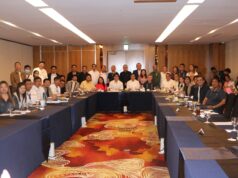This surfaced during the News@Hues forum of the Pampanga Press Club at Park Inn at Radisson Clark here Wednesday, with DOLE regional director Anna Dione as guest.
“We are still studying the effect of TRAIN based on inputs given us (by the DOF) indicating that there is yet no basis for another wage hike based on supervening events that could justify such increase,” Dione said.
Dione also said that the increases in the prices of basic goods are supposed to be temporary and would eventually “flatten.” Because of this, any decision on wage increases has been put on hold, she added.
Asked by Punto which agency has been providing DOLE with data affecting any justification for increase in wages, Dione identified the DOF.
The DOF is known to have authored and pushed for the TRAIN law, whose Package 1 had effected the increase in the prices of fuel, as well as other products.
It has also been pushing for the passage of a Package 2 that would reportedly scrap the privileges of firms in economic zones and freeports nationwide amid fear in the business sector this would lead to flight of foreign investors.
Dione said, however, that there has been no move on the part of labor sector representatives in the regional tripartite wage and productivity board to raise minimum wage in Central Luzon.
At the same time, Dione reported that Central Luzon has about 4.1 employed folk, although only 14,465 of them belong to 111 labor unions in the region.
She also said the DOLE has continued to zero in on three objectives, including enforcement of labor standards and good labor relations, developmental programs covering livelihood, employment facilitation and, emergency programs, and programs covering overseas Filipino workers.
“We are having safety practitioners organized per province for occupational safety and health which are not being given enough attention. This has big impact when adverse things happen,” she noted.
Dione said her agency in Central Luzon has only 55 labor inspectors “so we have to have advocacy for volunteerism to boost safety practice in firms. In these firms, there is family welfare. We are federating this,” she stressed.
“Also on labor relations, many organizations are being formed in Region 3 where we have paralegal organizations from different organized sectors where workers can seek redress of grievances to avoid full-fl edged litigations,” she said.
Dione also cited the importance of employment facilitation which, she noted, is the “biggest network is the Public Employment Service Office (PESO) which was institutionalized by law although in practice, only a few have been institutionalized because of budget lack in the local government units.
In most cases, only one or a few personnel are assigned to the PESO, she added.




